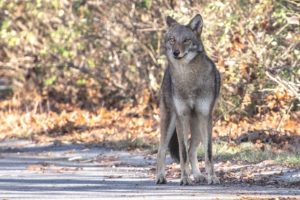PROVINCETOWN — Coyotes have been in the news here recently, and wildlife experts say the trouble they sometimes cause is the result of uninformed human behavior.
A three-year-old girl was bitten by a coyote on North Herring Cove Beach on Wednesday evening, Aug. 11, and taken to Cape Cod Hospital in Hyannis, according to a Cape Cod National Seashore press release.
Park rangers quickly responded to the incident, which took place at about 8:30 p.m., located the animal, and shot it. It disappeared into the thick underbrush. The next morning, rangers found the carcass about 50 yards from where it had been shot. A rabies test on the animal was negative.
The child, who was not identified, was reported to have injuries that were not considered life threatening.
Another scary coyote encounter took place on Race Point Beach in late July. Marcy Sterlis, an assistant principal at William Alexander Middle School in Brooklyn, N.Y., was taking a solitary morning walk when she was approached by an aggressive coyote. The animal, looking for food, circled Sterlis for about 10 minutes while she tried to chase it away by waving a stick at it. The encounter was filmed by a fisherman in a nearby boat and posted online. Another fisherman who saw what was happening beached his boat and rescued Sterlis.

A third incident took place in Truro in mid-July, when H. Michael “Ziggy” Zografakis came to the aid of a neighbor who was walking his dogs and was cornered by a pair of coyotes. Zografakis responded to the neighbor’s call for help by driving his car to the spot.
“Normally, you’d think they would run away quickly,” he told the Independent, “but even as I slowly drove closer, they did not run into the forest right away. I’ve never seen coyotes that were so bold before.”
Animal Control Officer Desmond Keough, who serves both Wellfleet and Eastham, said that, in the past, most coyote-human interactions here happened in the winter. But coyotes have become more present in the summer, he said, and he has seen more of them this year than ever before.
The coyotes on the Outer Cape are all Eastern coyotes, also known as coywolves. They are a hybrid subspecies of coyote and wolf, first discovered in 1969 in southeastern Canada. They have now expanded their territory across the East Coast of the U.S. and onto Cape Cod.
“Many people wrongly think that there are two species of coyotes on the Cape, the coyote and the coywolf,” explained Mark Faherty of the Wellfleet Bay Wildlife Sanctuary. “In reality, the coywolf is the only one that resides on the Cape.”
The key to peaceful coexistence with the Cape’s coyotes is to separate ourselves from them as much as possible, said Keough. They are an important part of the Cape’s ecology, he added, and humans should realize that when we are on their territory we have a responsibility to keep them wild. Keough advises steering clear of coyotes and, especially, not feeding or closing distance with them.
Humans feeding coyotes, either intentionally or unintentionally, is what causes most of the problems. That is how they lose their normal fear of humans. When coyotes, which are natural hunters, start to associate humans with food, they seek out humans and expect to be fed. Leaving trash or compost in the open will attract them; if they find food there once, they will keep coming back.

“When wild animals lose their fear of people, they behave unpredictably and aggressively, resulting in injuries to people and a sad ending for the habituated animal,” wrote the National Park Service in a recent advisory.
If you encounter a coyote, said Keough, turn away. If the coyote approaches, make yourself appear large and be as loud as possible.
Keeping dogs on leash at all times drastically decreases the chances of something untoward happening, said Keough. If you see a coyote while walking your pet, pick the dog up and make lots of noise.
Hunting coyotes is permitted by the state as a way of controlling the animals’ population. Stores like Powderhorn Outfitters in Hyannis even have contests for the biggest coyote hunters bring in. Licensed hunters can hunt coyotes between Oct. 16, 2021 and March 8, 2022, excluding Sundays.
But Keough said he does not believe culling coyotes is an effective way to decrease the interactions people fear. “Coyotes will be around forever,” he said. “If you tried to kill them all, more would come, across the canal or across the bridge.”
Sightings of assertive coyotes should be reported to National Park Service rangers at (617) 242-5659.
Cole Scott Tunstall of North Truro is entering the eighth grade in the Provincetown Schools.
Editor’s Note: Young Writers and Editors
Cole Scott Tunstall and Benjamin Siegel took part in the Independent’s Summer Journalism Workshop for middle and high school students. Over a few weeks’ time, they worked to research and write their stories, with Summer Fellows Cam Blair and Ben Glickman as their editors. By chance, both pursued the question of co-existence between humans and the wild animals in our midst. Benjamin Siegel’s story on sharks and shark deterrents is linked here. —Ed Miller



